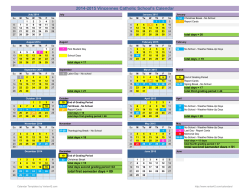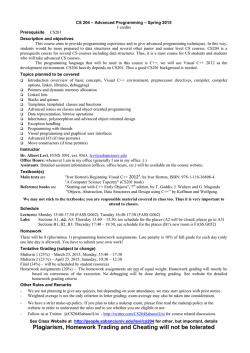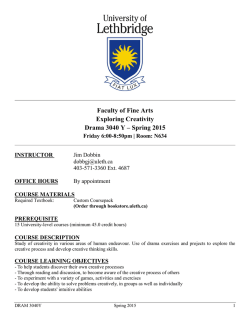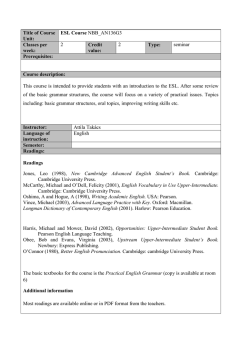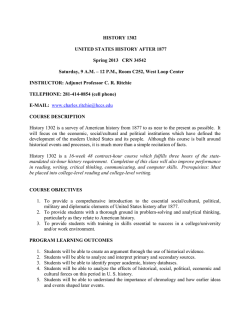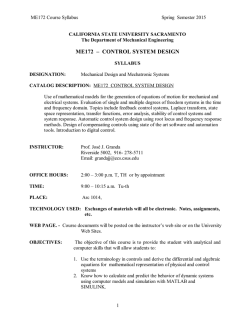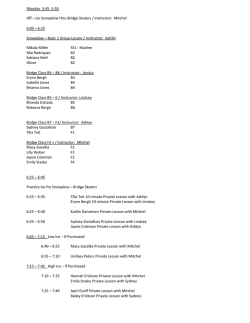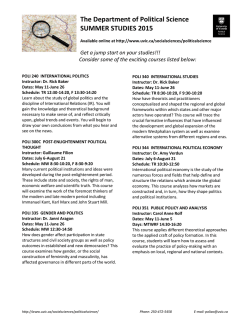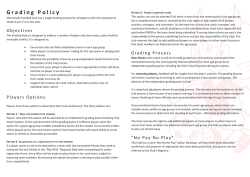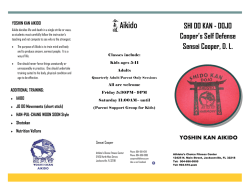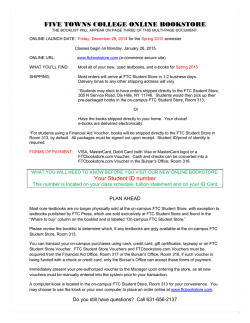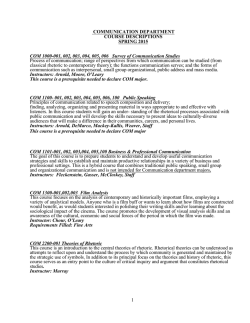
CMSC 122 Introduction to Computer Programming via the Web
CMSC 122 Introduction to Computer Programming via the Web Spring 2015 Course Syllabus Instructor: Pedram Sadeghian, Ph.D. E-mail: [email protected] (make sure you write the cs) Office: A.V. Williams 3251 Office Hours: MWF 11 AM – 12 PM Other times by appointment TAs: Section 0101 – MWF 12:00 to 12:50 PM Name Bor-Chun (Sirius) Chen 0201 – MWF 1:00 to 1:50 PM Rahmatri (Diko) Mardiko Majeed Kazemitabaar 0301 – MWF 2:00 to 2:50 PM E-mail [email protected] Office Hours T 3:00-5:00 PM W 8:00-10:00AM [email protected] TTH 9:00 to 11:00 AM [email protected] MF 3:00 to 5:00 PM Note: You can see me or any of the TAs for general help on the course. All TAs will have their office hours in A.V. Williams 1112. Course Description: Introduction to computer programming in the context of developing full featured dynamic web sites. Uses a problem solving approach to teach basics of program design and implementation using JavaScript; relates these skills to creation of dynamic web sites; then explores both the potential and limits of web-based information sources for use in research. Intended to help relate a student's major to these emerging technologies. Restrictions: Must not have completed any courses from CMSC131-499 course range; and must not be concurrently enrolled in CMSC131. Credit only granted for: CMSC122 or CMSC198N. Formerly: CMSC198N. Textbooks: HTML and CSS: Design and Build Websites, by Jon Duckett. ISBN: 978-1-118-00818-8 JavaScript and JQuery: Interactive Front-End Web Development, by Jon Duckett. ISBN: 978-1-118-53164-8 Teaching Methods: Classroom lectures, demonstrations, and in-class programming activities. Topical Content: History of the Web/Internet Internet and Society Web/Internet Fundamentals HTML/CSS for dynamic web sites Web authoring tools Design (pseudocode) Input/Output/Expressions in JavaScript Conditional/Iteration Statements in JavaScript Testing/Debugging Aggregate types in JavaScript Web Page Evaluation Research-Quality Web Searching Basics of usability and art theory in web page design Basics of e-commerce and tool integration in the web Grades: Your final grade will be computed from the following components: Projects Paper Exam 1 Exam 2 Final Exam 48% 8% 12% 12% 20% Letter grades will be assigned as follow: 90 ≤ A ≤ 100 80 ≤ B < 90 70 ≤ C < 80 60 ≤ D < 70 F < 60 The upper/lower values of each range will be reserved for +/- grades. Incomplete grades will only be given for medical illness or other dire circumstances. Projects: Due dates and times for projects will be posted on Canvas. You may submit a project up to 24 hours after the due date, but you will be penalized 20 points (we will subtract 20 points from your total). Project Implementation: Projects in this class must be completed individually and collaboration is not permitted. All assignments can be done on the machine of your choice. You are welcome to do the work on a home computer if you have one. There should not be any machine-specific dependencies in your code. However, if we are not able to run your program because there is a difference between your and our computer environments, you must work with us to get your program to work in our environment. Paper: The paper will be due at the beginning of class on the due date. It will not be accepted after the due date unless there are very extraordinary circumstances. Final Exam: The date and time for all three sections is Thursday May 14th from 4 to 6 PM. Excused Absences: Any student who needs to be excused for an absence from a single class session, due to a medically necessitated absence shall: Make a reasonable attempt to inform the instructor of his/her illness prior to the class. If you are going to miss an in-class assignment then we expect to hear from you (either email or a telephone message) before the class session begins. Upon returning to the class, present their instructor with a self-signed note attesting to the date of their illness. The note must contain an acknowledgment by the student that the information provided is true and correct. Providing false information to University officials is prohibited under Part 9(h) of the Code of Student Conduct (V-1.00(B) University of Maryland Code of Student Conduct) and will result in disciplinary action. This self-documentation may not be used for the Major Scheduled Grading Events as defined below and it may only be used for 1 class meeting during the course. Any student who needs to be excused for more than one absence, or for a "Major Scheduled Grading Event", must provide written documentation of the illness from the Health Center or from an outside health care provider. This documentation must verify dates of treatment and indicate the timeframe that the student was unable to meet academic responsibilities. The documentation should be given to the instructor, not the TA. We will not accept a "self-signed" note for "major scheduled grading events", as defined below, nor for multiple absences. The note must be signed by a health care professional. The Major Scheduled Grading Events for this course include: Exam #1 Exam #2 Final Exam Programming Projects Research Paper Grading: If you need clarification on the grading of a project/paper, please first see your TA (find the TA for your section in the table above). If your question/concerns are still not addressed, please come and see me. Questions about grading must be brought to our attention no later than 1 week after the grade has been posted. Questions about grading of an exam must be brought to our attention on the day the exam is returned. Attendance: Class attendance is required. If you miss a class, you are responsible for the material that was covered on that day. Please don’t assume that everything covered in class will be posted on Canvas. You must attend the section that you are registered in and your exam will not be graded if you show up to any of the other two sections on exam days. Academic Honesty: All assignments/exams must be done individually. Please visit the webpage of the Student Honor Council for a detailed explanation of what constitutes academic dishonesty. Note that it includes not only cheating, fabrication, and plagiarism, but also includes helping other students commit acts of academic dishonesty by allowing them to obtain copies of your work. You are allowed to use the Web for reference purposes, but you may not copy code from any website or any other source. In short, all submitted work must be your own. Cases of academic dishonesty will be dealt with harshly. Each such case will be referred to the University's Office of Judicial Programs. If the student is found to be responsible of academic dishonesty, the typical sanction results in a special grade "XF", indicating that the course was failed due to academic dishonesty. More serious instances can result in expulsion from the university. If you have any doubt as to whether an act of yours might constitute academic dishonesty, please contact your instructor. Course Evaluations: Your participation in the evaluation of courses through CourseEvalUM is a responsibility you hold as a student member of our academic community. Your feedback is confidential and important to the improvement of teaching and learning at the University as well as to the tenure and promotion process. Please go directly to the website (www.courseevalum.umd.edu) to complete your evaluations. By completing all of your evaluations each semester, you will have the privilege of accessing online, at Testudo, the evaluation reports for the thousands of courses for which 70% or more students submitted their evaluations. Disability Support Services: Any student eligible for and requesting reasonable academic accommodations due to a disability is requested to provide, to the instructor in office hours, a letter of accommodation from the Office of Disability Support Services (DSS) within the first two weeks of the semester. If special accommodations are to be given for any exam, then the student is also required to schedule the exam and provide to the instructor (before/after class) the form that specifies the scheduled time and date of the requested accommodation. This form must be provided at least four days before the exam. Please note that the time/date of the scheduled exam must overlap with the time/date of the regular in-class exam. You may not schedule the exam at an alternate time or date.
© Copyright 2026
